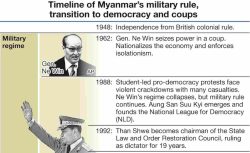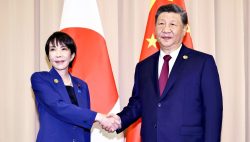15:52 JST, December 11, 2024
To accelerate decarbonization, it is becoming increasingly important for companies to make efforts to reduce their carbon dioxide emissions. It is hoped that such efforts will be boosted through the emissions trading system to be introduced by the government.
The government has decided to require companies that emit 100,000 tons or more of CO2 per year in Japan to participate in the emissions trading system in order to encourage corporations to step up their decarbonization efforts. A total of 300 to 400 companies in the steel, petroleum, automobile, chemical and other industries are expected to participate.
The plan is to allocate emission quotas to each company in fiscal 2026 and begin full-fledged trading in fiscal 2027.
The majority of greenhouse gases are CO2. Of these emissions, more than 40% are accounted for by the energy conversion sector, including power plants, followed by the industrial sector at just less than 30% and the transportation sector at about 20%.
Emissions in fiscal 2022 were about 1.1 billion tons in Japan. The government intends to set a new target of reducing emissions by 60% from the fiscal 2013 level in fiscal 2035 to the mid-500 million tons range. To achieve this goal, it is essential to accelerate decarbonization especially in the industrial sector, which is one of the major sectors.
A specific mechanism under the emissions trading system is that the government first will allocate emission quotas to each company for free. Then, if a company does not reach the upper limit of its quota of CO2 emissions involving its production activities and has a surplus of its emission quota, the company can sell it to another firm.
On the other hand, a company that emits CO2 exceeding its quota has to buy quotas from other companies to eliminate the excess. If the excess is left unattended, the company will be required to face such burdens as paying a commensurate fee.
Through this mechanism, the more a company reduces its CO2 emissions, the more profits it makes. Therefore, the system is expected to encourage companies to decarbonize.
The biggest focus of the future detailed system design will be on the size of the emission quotas to be allocated to each company.
Of the three main sectors, in the industrial sector, the steel industry accounted for about 40% of emissions and the chemical industry was at just less than 20%, with the two industries accounting for the majority of emissions.
If the quotas are set loosely, there is a possibility that companies may not make progress in their decarbonization efforts. On the other hand, if the quotas are set too strictly, Japanese companies’ costs will increase and their international competitiveness could decline.
The European Union and South Korea have already introduced an emissions trading system. In South Korea, it is reported that a number of companies initially filed their objections to the quotas because they were set too strictly. Such a situation must be avoided.
It is important for Japan to elicit positive corporate efforts such as by providing additional quotas to companies that have conducted research and development or built new factories for decarbonization technologies.
(From The Yomiuri Shimbun, Dec. 11, 2024)
Top Articles in Editorial & Columns
-

Myanmar Will Continue Under Military Rule Even After Election, Ex-Ambassador Maruyama Says in Exclusive Interview
-

40 Million Foreign Visitors to Japan: Urgent Measures Should Be Implemented to Tackle Overtourism
-

Expansion of New NISA: Devise Ways to Build up Household Assets
-

China Criticizes Sanae Takaichi, but China Itself Is to Blame for Worsening Relations with Japan
-

Withdrawal from International Organizations: U.S. Makes High-handed Move that Undermines Multilateral Cooperation
JN ACCESS RANKING
-

Univ. in Japan, Tokyo-Based Startup to Develop Satellite for Disaster Prevention Measures, Bears
-

JAL, ANA Cancel Flights During 3-day Holiday Weekend due to Blizzard
-

China Confirmed to Be Operating Drilling Vessel Near Japan-China Median Line
-

China Eyes Rare Earth Foothold in Malaysia to Maintain Dominance, Counter Japan, U.S.
-

Japan Institute to Use Domestic Commercial Optical Lattice Clock to Set Japan Standard Time




















